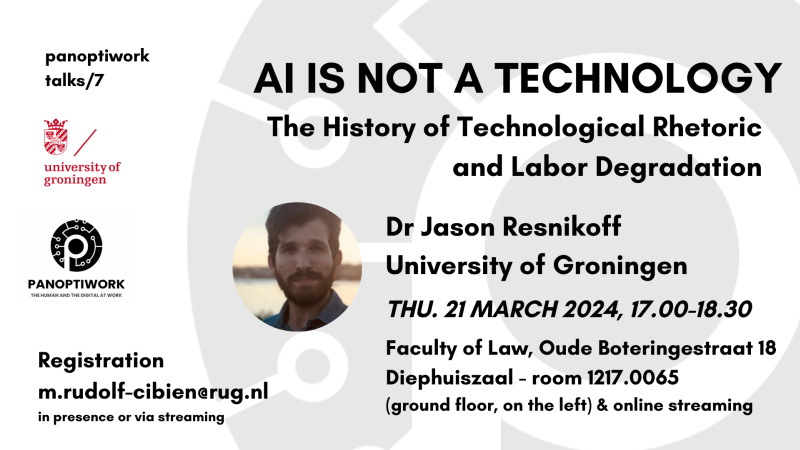Panoptiwork Talks/7: AI is not a Technology. The History of Technological Rhetoric and Labor Degradation
| When: | Th 21-03-2024 17:00 - 18:30 |
| Where: | Diephuiszaal at the Faculty of Law (Room 1217.0065, Oude Boteringestraat 18, Groningen) |
On the 21st of March 2024, at 17.00, Panoptiwork will host its seventh talk entitled: “AI is not a Technology. The History of Technological Rhetoric and Labor Degradation”. The talk will be held in the Diephuiszaal at the Faculty of Law (Room 1217.0065, Oude Boteringestraat 18, Groningen). Large part of the meeting will be dedicated to a discussion with participants, so get prepared to open a debate! Drinks will follow.
Dr. Jason Resnikoff will give the talk. He is Assistant Professor of Contemporary History at the Faculty of Arts and is involved within the Panoptiwork network.
REGISTRATION (hybrid): please email m.rudolf-cibien rug.nl.

Hereunder you can read the abstract of his presentation:
Since the release of ChatGPT in November of 2022, researchers, tech executives, and journalists have claimed that society is now in the midst of a technological “revolution.”1 AI, they claim, will soon replace human beings at work2. But these same sources are usually silent as to what, if anything, makes AI a discrete technology. This discrepancy between the big claims concerning supposed labor-replacing technology and the technical vagueness of those material changes, however, is not a minor shortcoming: it is the essence of the phenomenon known as AI, and it has a history.
In the immediate aftermath of the Second World War, executives as the Ford Motor, saddled with a militant union they could not oust from the shop floor, coined a new term: “automation.” Claiming that automation was “a new concept—a new philosophy—of manufacturing,” the word’s substance actually lay in its ideological content3. More than a description of a new technology, “automation” stood in for an argument that all technological progress meant the disempowerment of the industrial proletariat. But while executives claimed that “automation” reduced labor, workers themselves experienced the changes to the workplace as a speed-up and degradation of their working conditions.
AI, this paper argues, is the direct inheritor of the automation discourse. This paper will track the origins of AI as a concept, demonstrate the links between it and the automation discourse of the middle of the twentieth century, and show how the main discursive function of the idea of AI today is, once again, to depict labor degradation as technological progress.
